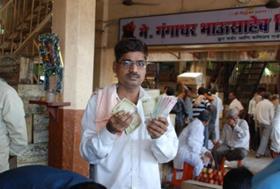
The Indian government’s abrupt move to demonetise the 500 and 1,000 rupee notes on 8 November has caused a major slowdown for the country’s fresh fruit import trade.
Daily wholesale market sales plummeted by as much as 80 per cent in the wake of the announcement, and are expected to take a number of weeks to pick up again, according to key local importers.
In the wake of Prime Minister’s Narenda Modi’s live TV address, major Indian fruit importer IG International issued a statement to suppliers informing them to “skip all programmed shipments for two weeks” while the new currency was reinstated.
Modi gave the nation just four hours’ notice that 500 (US$7) and 1,000 rupee notes – which account for an estimated 86 per cent of the currency in circulation – would no longer be legal tender. People were told they could deposit or exchange their old notes in banks until 30 December and new 500 and 2,000 rupee notes would be issued.
India is a cash-driven economy, and at least 90 per cent of the wholesale market business is done in cash. So the move had an instant and dramatic impact on the fruit trade.
“It has slowed things down as street vendors and other traditional retailers take cash from their customers and use the same cash to pay wholesalers,” said Parth Karvat of leading importer Yupaa. “So with consumers and wholesalers not accepting old notes from retailers with immediate affect, transaction volumes have been reduced. Some markets like Delhi have been severely affected but things are recovering as more new notes come into circulation.”
IG’s Tarun Arora said daily sales had fallen to 20 per cent of normal rates. “Sales are down by 70-80 per cent in all wholesale markets across India,” he said.
Besides the immediate impact on transactions, there has also been a liquidity strain, as India’s banks have not been able to issue new currency fast enough.
“It will take several weeks to get the liquidity back to market with the release of new notes,” said Arora, who pointed out that the government continues to cap the daily and weekly amounts people can withdraw from banks.
The move has also affected the Indian stock market and currency, with the rupee sliding to an eight-and-a-half month low versus the US dollar in the past week. “The rupee has suddenly become weaker and this has impacted the importers,” noted Karvat.
Despite the current turmoil for the trade, Karvat said the impact is likely to be short-lived. “A slowdown in the market, less liquidity and a weaker rupee have all temporarily affected the fruit trade,” he said. “However, these are only short-term and temporary hurdles.”
Karvat believes currency availability and consumption levels will return to normal by the end of December although he expects it to take until March for the economy to fully recover.
Overall, he believes India will be better off for the government’s move, which is aimed at cracking down on corruption, and illegal cash holdings known as “black money”.
“In the medium- to long-term it’s a very good move to help honest, tax-paying citizens,” said Karvat. “Everybody who had unaccounted or undisclosed income which they were using to negatively compete with honest individuals and companies is hit very badly.”



